- Home
- Roald Dahl
Fear Page 15
Fear Read online
Page 15
Doors banged everywhere, and furniture was overturned, as the beatific throng surged and stumbled through the involved darkness of the old building. Glasses went and china and Birmingham brass warming pans. In a moment, Gerald heard the Japanese armour crash to the boards. Phrynne screamed. Then a mighty shoulder, made strong by the sea’s assault, rammed at the panelling and their door was down.
‘The living and the dead dance together.
Now’s the time. Now’s the place. Now’s the weather.’
At last Gerald could make out the words.
The stresses in the song were heavily beaten down by much repetition.
Hand in hand, through the dim grey of the doorway, the dancers lumbered and shambled in, singing frenziedly but brokenly; ecstatic but exhausted. Through the stuffy blackness they swayed and shambled, more and more of them, until the room must have been packed tight with them.
Phrynne screamed again. ‘The smell. Oh God, the smell.’
It was the smell they had encountered on the beach; in the congested room, no longer merely offensive, but obscene, unspeakable.
Phrynne was hysterical. All self-control gone, she was scratching and tearing, and screaming again and again. Gerald tried to hold her, but one of the dancers in the darkness struck him so hard that she was jolted out of his arms. Instantly it seemed that she was no longer there at all.
The dancers were thronging everywhere, their limbs whirling, their lungs bursting with the rhythm of the song. It was difficult for Gerald even to call out. He tried to struggle after Phrynne, but immediately a blow from a massive elbow knocked him to the floor, an abyss of invisible trampling feet.
But soon the dancers were going again; not only from the room, but, it seemed, from the building also. Crushed and tormented though he was, Gerald could hear the song being resumed in the street, as the various frenzied groups debouched and reunited. Within, before long there was nothing but the chaos, the darkness, and the putrescent odour. Gerald felt so sick that he had to battle with unconsciousness. He could not think or move, despite the desperate need.
Then he struggled into a sitting position, and sank his head on the torn sheets of the bed. For an uncertain period he was insensible to everything: but in the end he heard steps approaching down the dark passage. His door was pushed back, and the Commandant entered gripping a lighted candle. He seemed to disregard the flow of hot wax which had already congealed on much of his knotted hand.
‘She’s safe. Small thanks to you.’
The Commandant stared icily at Gerald’s undignified figure. Gerald tried to stand. He was terribly bruised, and so giddy that he wondered if this could be concussion. But relief rallied him.
‘Is it thanks to you?’
‘She was caught up in it. Dancing with the rest.’ The Commandant’s eyes glowed in the candlelight. The singing and dancing had almost died away.
Still Gerald could do no more than sit up on the bed. His voice was low and indistinct, as if coming from outside his body. ‘Were they … were some of them …?’
The Commandant replied more scornful than ever of his weakness. ‘She was between two of them. Each had one of her hands.’
Gerald could not look at him. ‘What did you do?’ he asked in the same remote voice.
‘I did what had to be done. I hope I was in time.’ After the slightest possible pause he continued. ‘You’ll find her downstairs.’
‘I’m grateful. Such a silly thing to say, but what else is there?’
‘Can you walk?’
‘I think so.’
‘I’ll light you down.’ The Commandant’s tone was as uncompromising as always.
There were two more candles in the Lounge, and Phrynne, wearing a woman’s belted overcoat which was not hers, sat between them drinking. Mrs Pascoe, fully dressed but with eyes averted, pottered about the wreckage. It seemed hardly more than as if she were completing the task which earlier she had left unfinished.
‘Darling, look at you!’ Phrynne’s words were still hysterical, but her voice was as gentle as it usually was.
Gerald, bruises and thoughts of concussion forgotten, dragged her into his arms. They embraced silently for a long time: then he looked into her eyes.
‘Here I am,’ she said, and looked away. ‘Not to worry.’
Silently and unnoticed, the Commandant had already retreated.
Without returning his gaze, Phrynne finished her drink as she stood there. Gerald supposed that it was one of Mrs Pascoe’s concoctions.
It was so dark where Mrs Pascoe was working that her labours could have been achieving little; but she said nothing to her visitors, nor they to her. At the door Phrynne unexpectedly stripped off the overcoat and threw it on a chair. Her nightdress was so torn that she stood almost naked. Dark though it was, Gerald saw Mrs Pascoe regarding Phrynne’s pretty body with a stare of animosity.
‘May we take one of the candles?’ he said, normal standards reasserting themselves in him.
But Mrs Pascoe continued to stand silently staring; and they lighted themselves through the wilderness of broken furniture to the ruins of their bedroom. The Japanese figure was still prostrate, and the Commandant’s door shut. And the smell had almost gone.
Even by seven o’clock the next morning surprisingly much had been done to restore order. But no one seemed to be about, and Gerald and Phrynne departed without a word.
In Wrack Street a milkman was delivering, but Gerald noticed that his cart bore the name of another town. A minute boy whom they encountered later on an obscure purposeful errand might, however, have been indigenous; and when they reached Station Road, they saw a small plot of land on which already men were silently at work with spades in their hands. They were as thick as flies on a wound, and as black. In the darkness of the previous evening, Gerald and Phrynne had missed the place. A board named it the New Municipal Cemetery.
In the mild light of an autumn morning the sight of the black and silent toilers was horrible; but Phrynne did not seem to find it so. On the contrary, her cheeks reddened and her soft mouth became fleetingly more voluptuous still.
She seemed to have forgotten Gerald, so that he was able to examine her closely for a moment. It was the first time he had done so since the night before. Then, once more, she became herself. In those previous seconds Gerald had become aware of something dividing them which neither of them would ever mention or ever forget.
The Telephone
by Mary Treadgold
‘If you would catch the spleen and laugh yourselves into stitches, follow me,’ I called to Sir Toby – and as I ran across the stage caught the eye of the white-haired man in the V.I.P.’s row. The light from the stage streamed out over the darkened theatre. He was leaning forward, amused, laughing – and as Sir Toby chased after me I laughed back. I had fallen in love with him at sight – there, from the middle of the stage of an end-of-term Dramatic School performance of Twelfth Night.
We met at the party after the show – and met again – and again – and then we began to meet in backstreet Soho restaurants, and then in my tiny London flat. I loved him desperately. I had never been in love before, and Allan had not been in love for over thirty years – not since he had married Katherine, he told me, in some queer little snowbound Canadian township. ‘I never meant this to happen. I’ve never felt like this about any woman before. I don’t understand myself,’ he said restlessly.
All through that winter I clung to Allan. We kept the long secret winter afternoons and evenings together. There was so much that he wanted to give me – the things that I wanted for myself, more than wanted, believed that I must have. ‘I want to give you kindness – and shelter – and love,’ he said. He and Katherine had had no children.
But it could not go on like that. Every time he came to my flat the conflict in him deepened. It was like the deepening rift splitting a tree-trunk down to its roots. He would turn wearily towards me. ‘How can I hurt her?’ he would ask me. ‘Katherine and I – we
’ve been together all these years. Long before you were even born. Why, I knew her when she was a school girl – a child. Look at what we’ve done together – look at our work.’
I tried to understand. But I seemed to see only a grey ghostly marriage, a kind of deadly, intellectual middle-aged companionship stretching back down the years. There was nothing there, I thought, that should be preserved. It would be so different for us, I thought, and I clung the more desperately. ‘I cannot live without you,’ I said, believing that I could not.
Our dilemma, Allan’s agony, was resolved by Katherine finding out. There was no drama, no scenes. During the next few months I never knew what passed between them. I dared not ask. I felt like a child whose parents are gravely discussing in the next room portents beyond its comprehension. But presently Katherine went unobtrusively back to Canada without Allan …
Allan shut up the house in Hampstead, and talked of selling it. We neither of us wanted to live there. Immediately after our marriage we came up to this cottage in the Western Highlands which we rented through an advertisement in the Times. That year Scotland had one of its rare perfect summers. We bathed and fished, and the long halcyon days passed over us with scarcely a break in the weather. I was blissfully happy. Free from the conflicts and indecisions of the past months, we turned again to each other, discovering new releases, a new and deepening absorption. Our cottage lay by the shore in a curve of the hills, and whenever I remember that summer it seems as if the falling tides of the Atlantic were always in our ears, and as if the white sands were always warm under our bare feet.
But again, it could not last. One scorching day in early September I came round the cottage at lunch-time, carrying a pot-roast over to the table under our rowan-tree. I found Allan sitting staring down at an open airmail letter that the postman had just delivered. He looked up as I put the pot-roast down. His face was dazed, and his hands were shaking.
‘Katherine is dead,’ he said incredulously. ‘Dead … This letter’s from her sister in Toronto … She says –’ and he stared again at the letter as though they were lying words, ‘she says – heart failure. Very peacefully, she says.’
His eyes went past mine to the open sea. Then he got up and went into the house, while I – I stayed, pleating the gingham cloth between my fingers. Once more I felt like the child who had inadvertently witnessed a parent’s distress – shocked yes, but horribly embarrassed. Then I followed Allan into the cottage, and I put my arms round him. All that day I watched over him in my heart as he moved about the place. But we did not mention Katherine – nor the next day – and, although I waited for Allan to speak, her name never passed our lips during the next three weeks.
Three weeks later to the day, among other letters forwarded from London by the Post Office, arrived the telephone bill for the Hampstead house – the second demand. We had forgotten about the first.
‘Damn,’ said Allan – we were once again eating our lunch in the garden – ‘damn, I ought to have had the thing disconnected before we ever left London.’
I picked up the envelope and looked at the date of forwarding. ‘They’ll probably have cut you off themselves by now,’ I said. But Allan was already crossing the grass to collect the pudding from the kitchen oven. ‘Go in by the hall,’ I called after him. ‘You can find out if it’s still connected by ringing the number. If you hear it ringing away at the London end you’ll know it’s still on.’
And I lay back in my deck-chair, staring up at the scarlet rowan-berries against the sky and thinking that Allan was beginning to hump his shoulders like an old man, and that his skin looked somehow as if the sea-salt were drying it out …
‘Well?’ I said. ‘Still connected?’ Perhaps I invented the slight pause before Allan carefully set down the apple-pie, and replied, ‘Yes – still connected.’
That evening I went up to bed alone, because Allan said he wanted to trim the lamps in the kitchen. I was sitting in the window in the late Highland dusk, brushing my hair and looking out over the sea, when I heard a light tinkle in the hall below. I turned my head. But the house lay silent. I went over to the door.
‘Hampstead 96843.’ Allan’s voice – low – strained – came up the stairs.
There was a long silence. And then my heart turned over, for I heard his voice again, whispering:
‘Oh, my dear – my dear –’
But the words broke off – and from the dark well of the hall came a low sob. I suppose I moved, and a floorboard creaked. Because I heard the receiver laid down, and I saw Allan’s shadow move heavily across the wall at the foot of the stairs.
We lay side by side that night, and we never spoke. But I know that it was daybreak before Allan slept.
During the next few days I became terribly afraid. I began to watch over Allan with new eyes, those of a mother. For the first time I knew a quite different tenderness, one that nearly choked me with its burden of grief and fear for him as he moved about the cottage like a sleepwalker, trying pathetically to keep up appearances before me, his face, as it seemed, ageing hourly in its weariness. I became frightened, too, for myself. I kept telling myself that nothing – nothing – had happened. But in the daytime I avoided looking at the dead black telephone inert on its old-fashioned stand in the hall. At night I lay awake, trying not to picture that telephone wire running tautly underground away from our cottage, running steadily south, straight down through the border hills, down through England … During that week I tried never to leave Allan’s side. But once I had to go off unexpectedly to the village shop. When I returned I had to pretend that I hadn’t seen him through the half-open door, gently laying down the receiver. And twice more in the evening – and there must have been other times – when I was cooking our supper, he slipped out of the kitchen, and I heard that faint solitary tinkle in the hall …
I could have rung up the telephone people, and begged them to cut off the Hampstead number. But with what excuse? I could have taken pliers and wrenched our own telephone out of its socket. I knew that nothing would be solved with pliers. But by the weekend I did know what I could try to do, for sanity’s sake, to prevent us from going down into the solitudes of our guilt.
On Friday afternoon – after tea – my opportunity came. It was a glorious evening – golden, with the sand blowing lightly along the shore, and a racing tide. I persuaded Allan to take the boat out to troll for mackerel on the turn. I watched him go off from the doorway. I waited until I actually saw him push the boat off from our small jetty. Then I turned back into the cottage, and closed the door behind me. I had shut out all the evening sunlight so that I could hardly see the telephone. But I walked over to it. I took it up in both my hands. I drew a long deep breath, and I gave the Hampstead number. All that I had been told of Katherine during those bad months in London had been of kindness and gentleness and goodness – nothing of revenge. To this I clung, and upon it I was banking. My teeth were chattering, and I was shaking all over when the bell down in London began to ring. I suppose at that moment I lost my head. I thought – I could have sworn – I heard the receiver softly raised at the far end. But I suppose I should have waited instead of bursting into words. Now I shall never know. And they were not even the words I’d planned. I suppose I reverted, being so frightened, to the kind of prayer one blurts out in childhood:
‘Please – please –’ I said down the mouth-piece. ‘Please let me have him now. I know everything I’ve done’s been wrong. It’s too late about that. But I won’t be a child anymore. I’ll look after him, like you’ve always done,’ I said. ‘Only please let me have him now. I’ll be a wife to him. I promise you – if that’s what you are wanting. I can get him right again, and I’ll take care of him. Now and for ever more,’ I said.
And I banged the receiver down, and fled upstairs to our bedroom. Through the window I could see the little boat bobbing about on the sea. I sat down in the window in the full evening sun, and I shook all over, and I cried and cried …
In the small hours of the morning came the crisis. I woke – it must have been about half past four. The bed was empty. In an instant I was wide awake, because down in the hall I could hear the insistent tinkle of the telephone receiver, struck over and over again, and above it, mingled with it, Allan’s voice. Somehow I got the lamp lighted. The shadows tilted all over the ceiling and I could hear the paraffin sloshing round the bowl as I stumbled out to the head of the stairs.
‘Katherine – Katherine –’
He was shaking the receiver, and babbling down the mouth-piece when my light from the staircase fell upon him. He let the receiver drop, and stood looking up at me.
‘I can’t get her,’ he said. ‘I wanted her to forgive me. But she doesn’t answer. I can’t reach her.’
I brought him up the stairs. I can remember shivering with the little dawn sea-wind blowing through my cotton nightdress from the open window. I made him tea, while he sat in the window, staring up at the grey clouds of the morning. At last he said:
‘You must book yourself a room at one of the hotels in Oban. Only for a couple of nights. I’ll come back – probably tomorrow, or the next day. You see –’ and he began to explain carefully, politely as if to a foreigner, ‘you see, I’ve got to find Katherine, and so I have to go down unexpectedly to London –’
From our remote part of the Highlands there are only two trains a day. Allan went on the early morning one. I had, of course, no intention of going to any hotel. I knew where my promise to Katherine lay, where lay my love. I said ‘Yes – yes’ to everything Allan said, and stayed in the cottage all that day. And then I caught the evening train.
There was no chance of a sleeper. I huddled in the corner of a carriage packed with returning holidaymakers, my face turned first to the twilight, and then to the darkness rushing past the window. In the dead cold hours, when the other passengers sprawled and snored, the terror for Allan nearly throttled me. Once I dozed off, and woke, biting back a scream because I thought I saw the telephone wire running alongside the train, stretched and singing, ‘You’ll never know. You’ll never know …’

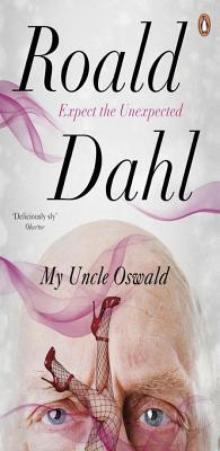 My Uncle Oswald
My Uncle Oswald The Best of Roald Dahl
The Best of Roald Dahl The Magic Finger
The Magic Finger Charlie and the Chocolate Factory
Charlie and the Chocolate Factory Fantastic Mr Fox
Fantastic Mr Fox Matilda
Matilda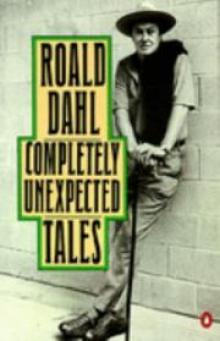 Completely Unexpected Tales: Tales of the Unexpected. More Tales of the Unexpected
Completely Unexpected Tales: Tales of the Unexpected. More Tales of the Unexpected The Wonderful Story of Henry Sugar and Six More
The Wonderful Story of Henry Sugar and Six More The Twits
The Twits The BFG
The BFG Danny the Champion of the World
Danny the Champion of the World The Witches
The Witches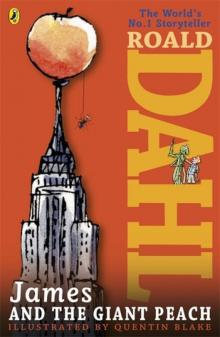 James and the Giant Peach
James and the Giant Peach Charlie and the Great Glass Elevator
Charlie and the Great Glass Elevator Skin and Other Stories
Skin and Other Stories Kiss Kiss
Kiss Kiss Switch Bitch
Switch Bitch The Giraffe and the Pelly and Me
The Giraffe and the Pelly and Me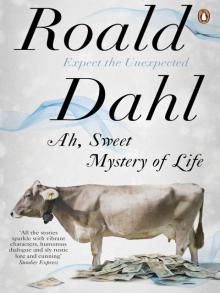 Ah, Sweet Mystery of Life
Ah, Sweet Mystery of Life Fear
Fear The Great Automatic Grammatizator and Other Stories
The Great Automatic Grammatizator and Other Stories Someone Like You
Someone Like You Charlie and the Great Glass Elevator c-2
Charlie and the Great Glass Elevator c-2 More About Boy
More About Boy Tales of the Unexpected
Tales of the Unexpected The Umbrella Man and Other Stories
The Umbrella Man and Other Stories Dirty Beasts
Dirty Beasts Roald Dahl's Mischief and Mayhem
Roald Dahl's Mischief and Mayhem The Collected Short Stories of Roald Dahl, Volume 1
The Collected Short Stories of Roald Dahl, Volume 1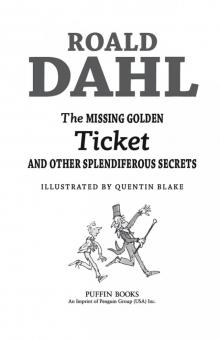 The Missing Golden Ticket and Other Splendiferous Secrets
The Missing Golden Ticket and Other Splendiferous Secrets Billy and the Minpins
Billy and the Minpins Over to You
Over to You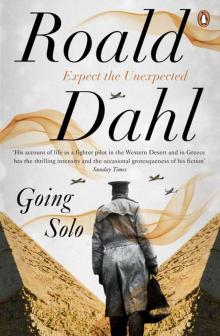 Going Solo
Going Solo Deception
Deception War
War Man from the South ee-3
Man from the South ee-3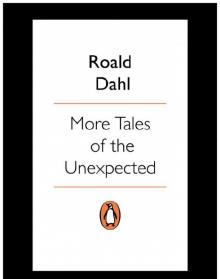 More Tales of the Unexpected
More Tales of the Unexpected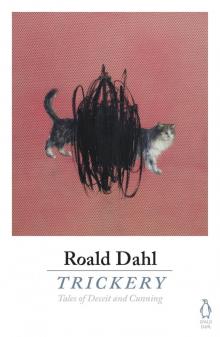 Trickery
Trickery Rhyme Stew
Rhyme Stew Charlie and the Chocolate Factory (Puffin Modern Classics relaunch)
Charlie and the Chocolate Factory (Puffin Modern Classics relaunch)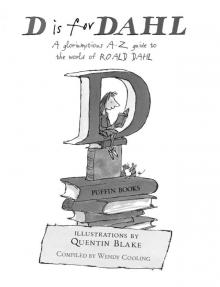 D is for Dahl
D is for Dahl Roald Dahl Whoppsy-Whiffling Joke Book
Roald Dahl Whoppsy-Whiffling Joke Book Spotty Powder and other Splendiferous Secrets
Spotty Powder and other Splendiferous Secrets Charlie and the Chocolate Factory c-1
Charlie and the Chocolate Factory c-1 Boy
Boy Completely Unexpected Tales
Completely Unexpected Tales Madness
Madness Innocence
Innocence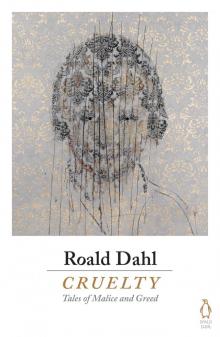 Cruelty
Cruelty George's Marvellous Medicine
George's Marvellous Medicine